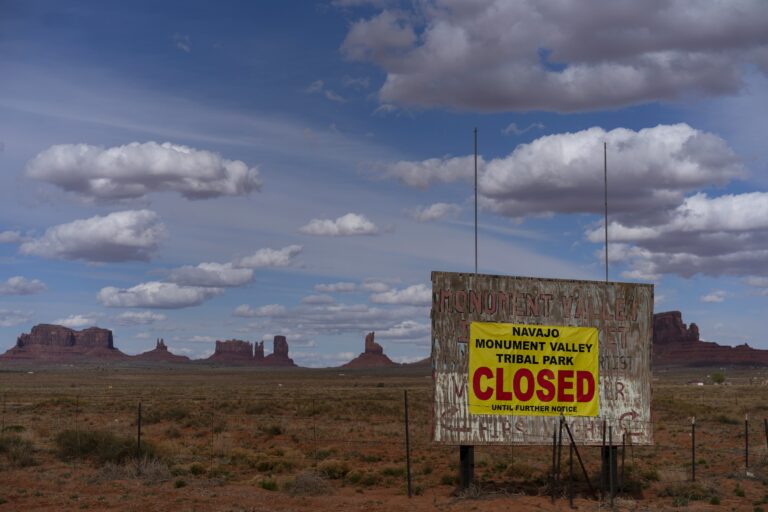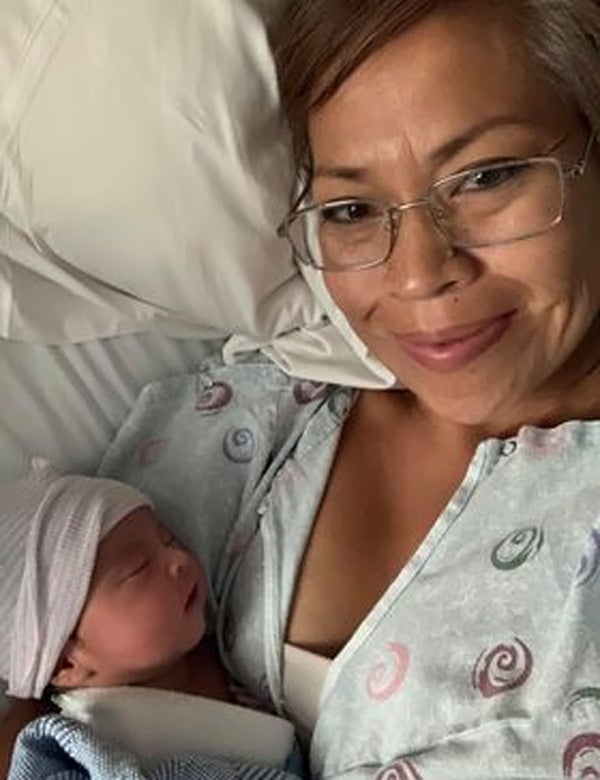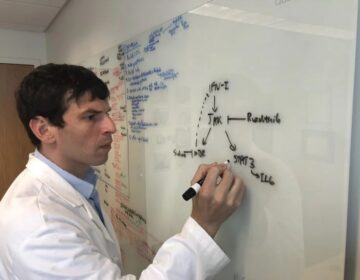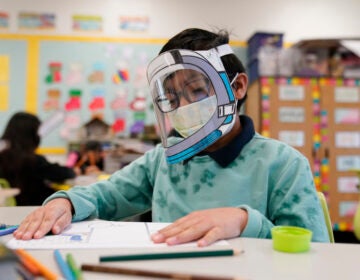‘We are not guinea pigs’: Trust issues and a COVID-19 vaccine trial in the Navajo Nation
The Navajo Nation has a death rate from the virus nearly double that of New Jersey. But skepticism about volunteering for Pfizer trial’s runs deep.
Listen 8:13
In this April 19, 2020, file photo, a sign reads "Navajo Monument Vally Tribal Park Closed Until Further Notice" posted at the entrance of Monument Valley in Oljato-Monument Valley, Utah, on the Navajo reservation. The Navajo Nation, one of the country's largest tribes, so far has signed off on about $60 million in spending on front-line workers against the virus, protective equipment, disinfecting of buildings, care packages and health care. (AP Photo/Carolyn Kaster, File)
This story is from The Pulse, a weekly health and science podcast.
Subscribe on Apple Podcasts, Stitcher or wherever you get your podcasts.
The last time I visited the Navajo Nation, I was in Piñon, Arizona, a four-hour drive by dirt road and two-lane highway from where I live in Phoenix. It was a Thursday morning, but nobody was rushing to school or work.
The reservation — the largest in the United States, occupying parts of Arizona, Utah and New Mexico — is expansive and beautiful. It is the home of Monument Valley, and that morning, as the orange and purple sunrise illuminated distant mountains and gave way to daylight, the only noise came from birds.
The unusual quiet was a result of COVID-19 mitigation measures. The reservation has a death rate from the coronavirus nearly double that of New Jersey — one of the worst affected U.S. states — and in May, Navajo Nation President Jonathan Nez enacted strict lockdowns to stop the spread. Since then, schools have been empty of students, there have been nightly curfews, and on the weekends all businesses — including grocery stores and gas stations — are closed. People driving there risk getting citations at police checkpoints. The reservation goes dark and quiet.
But in mid-September, there was a frenzy of virtual activity happening on Facebook. President Nez made an announcement: The Pfizer COVID-19 vaccine trial was coming to the Navajo Nation, and it was looking for volunteers.
The comments section under the announcement lit up with concerns from the Navajo people. Many expressed this sentiment: “Do not trust the government, we are not guinea pigs.”
One such comment was from Roxanne Tsosie, a Navajo woman and elementary school teacher in Farmington, New Mexico.
“The first thing I thought was just ‘No’, you know, ‘why is this happening?’” Tsosie said, reflecting on the moment she heard about the clinical trials.
She and others were not happy to hear Navajos would be part of the trials.
“Hearing about it just runs through the whole quick history in your head. It just kind of makes me sick,” Tsosie said.
The history she referred to is the long, ugly story of colonialism, disease, Western medical research and indigenous people. It goes far beyond vaccines, but the trials bring it to mind. And the news of the trials came at a really hard time.
The reservation is a small community full of tight-knit families. The virus hit it so hard, everybody knows somebody who’s gotten sick or passed away. Tsosie lost four family members to the virus and one of her close friends, who was just 46.
“When I lost my friend,” she said, fighting back tears, “that was the one that hit me the hardest because she left behind her kids, and it was just, it was tough.”
In a way, the vaccine trial points to progress and an end to the pandemic. But for Tsosie and so many others, it triggers painful memories.
“It’s just massive amounts of history that’s been swept under the rug and under the table,” she said.
In Tsosie’s mind, that history goes back to the moment Europeans stepped foot in the Western Hemisphere, bringing deadly diseases with them. Within decades, tens of millions of indigenous people died of smallpox, influenza, measles and other imported ailments. Settlers waged war on native populations and uprooted them from their homes through brutal forced migrations.
And again and again, they’ve been harmed under the guise of receiving care — from blankets infected with smallpox by British soldiers in the 1700s, to the forced sterilization of thousands of Native American women in the 1970s at the hands of the federally run Indian Health Services, the Native American population has taken hit after hit. And their numbers have dwindled.
“I just feel like we’re the lost, we’re basically the invisible race in the United States, you know, Indians across the board,” Tsosie said.
She and so many others who descended from those who survived just don’t trust the Western world and the U.S. government when it comes to health and medicine.
Shmuel Shoham is an infectious-disease expert with Johns Hopkins University School of Medicine who helps oversee coronavirus trials taking place in the Navajo Nation. He’s working on a plasma trial funded by the U.S. Department of Defense that’s raised skepticism similar to that about the vaccine trials.
Shoham said it’s critical to include different populations in the trials, and he’s excited to have the Navajo people on board.
“It’s important when looking at data to have it reflective of the people that actually have the disease itself,” Shoham said.
Volunteers are coming out for the trials, he said, and he hopes enrollment picks up as the trials progress. But he understands the hesitancy and the history, and knows that must be overcome to be successful.
“I will say that one of my favorite sayings is that progress happens at the speed of trust,” Shoham said. “The best time to have established trust was 10 years ago, 20 years ago. The second best time is today.”
Travis Teller is a traditional Navajo medicine man. They use herbs and healing ceremonies to treat the mental, physical and spiritual problems of the Navajo people. They’re also spiritual leaders for people on the reservation and safeguards of its ancient culture and language.
Subscribe to The Pulse
If Johns Hopkins or the Indian Health Services worked harder to collaborate with medicine men like himself, Teller said, it could improve the mistrust problem on the reservation.
“Medicine people are willing to share,” Teller said. “It’s just that nobody is willing to work with them or nobody is willing to reach out to them. The IHS just kind of puts them on the backburner.”
When the pandemic hit, Navajo people flocked to medicine men for help. Many of the medicine men were exposed to the virus, Teller said, and several died after contracting it. They lost elders, he said, and with them invaluable knowledge.
“We had enough. We had enough as the Diné people. We had enough,” Teller said. Diné means “the people” in the Navajo language, and it’s often the word they use to refer to themselves.
Like Tsosie, the history sticks in his mind.
“We need to think of one another as human existence, human beings as one, because we’re being treated so bad out here on the Navajo reservation,” Teller said.
Jamie Watchman-Johnson lives on the Navajo reservation in New Mexico, and she’s had personal experience with controversial medical practices involving Native Americans.
In September, she gave birth to a little girl, Haascheebah — her name means “Spirit of a Woman Warrior.” Last spring, Lovelace Hospital in Albuquerque was secretly testing Native American women for COVID-19 and separating them from their newborns while waiting for test results. The State of New Mexico is investigating the scandal now.

But even knowing this, Watchman-Johnson went there to deliver her baby.
“I still went there because I figured that they had learned their lesson, and they did treat me well and they didn’t separate me from my baby,” she said.
Despite the history and given her own experiences, Watchman-Johnson remains optimistic. She said she would take the COVID-19 vaccine once it’s fully approved. She just hopes her fellow Diné people know what they’re getting themselves into when they volunteer for the trials.
“You know, it’s 2020, and we think that the doctors have learned their lesson and everybody kind of wants the best interest for everyone,” she said.
But she seems to be in the minority; no one else I interviewed for this article was willing to take that leap. They were concerned about the safety of the vaccine and just weren’t ready to put all that horrible history behind them.
WHYY is your source for fact-based, in-depth journalism and information. As a nonprofit organization, we rely on financial support from readers like you. Please give today.




![CoronavirusPandemic_1024x512[1]](https://whyy.org/wp-content/uploads/2020/03/CoronavirusPandemic_1024x5121-300x150.jpg)


